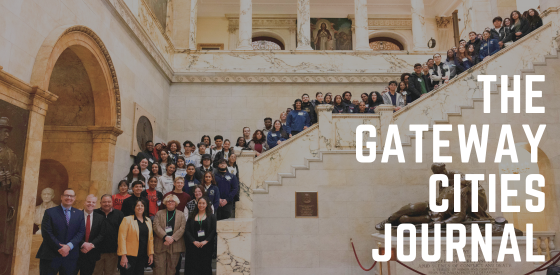Hundreds of students from Gateway Cities across the commonwealth descended on the State House last Wednesday for Early College Day. The power of so many students giving voice to the life-changing opportunities that they have received was moving. For Lt. Governor Driscoll—whose leadership has been integral to the initiative’s growth and success—it must have been especially rewarding to witness. Judging by the headline of her most recent column (“It’s time to scale early college”), the Boston Globe’s Marcela Garcia found it captivating.
We wholeheartedly agree that many more students need Early College, but as programs expand, setting emotions aside and rigorously documenting outcomes is more vital than ever. In this regard, we must recognize Rep. Jeffrey Roy’s as last week’s true hero.
A resident of Franklin, Rep. Roy is not officially a Gateway Cities caucus member, but he fought valiantly for Early College as co-chair of the higher education committee. And he’s remained steadfast since moving on to other House leadership roles. The day before students gathered on Beacon Hill, Rep. Roy appeared before the Early College Joint Committee (ECJC), an ad hoc board that governs the initiative. With unusual candor, he asked the group to provide a higher level of accountability.
Over the past five years, the legislature has invested at least $70 million in the Early College Initiative and the state’s annual spending is approaching $30 million. Rep. Roy wants a growth plan to reach far more students who could benefit from Early College, and more timely reporting on student outcomes. He also wants the public to have outcome data for each high school, rather than providing this level of detail only to program administrators.
As overseers of the state’s Early College initiative, members of the ECJC should be pushing for this level of accountability around growth targets and student outcomes, but they have shied away from setting transparent expansion goals for years, and they haven’t been unflinchingly asking tough questions about student outcomes.
A notable example was the ECJC’s discussion of how English Language Learners (ELL) are faring in Early College programs. The group has yet to ask for a rigorous review of how well programs serve this subgroup, which is approaching 600 students. In our 2021 report on equitable expansion of Early College, we noted that there is no extant evidence that Early College works for ELLs, and the limited research on this topic suggests Early College might even reduce postsecondary success for this subgroup. In another report last year, we reiterated the urgent need for rigorous evaluation of ELLs in Early College. While the Early College Initiative has ample resources for evaluation, the ECJC isn’t pressing administrators to use these funds to answer critical questions such as these.
We suspect part of the problem is the Early College Initiative is still at the leading edge when it comes to state evaluation of strategic initiatives. It is hard to point to another effort in Massachusetts that involves more data collection, particularly longitudinal data following students from K-12 into postsecondary institutions. But just because it is the best, doesn’t mean it’s good enough. As we get more and better data to gague how well our interventions serve students, state education agencies have an obligation to raise the bar.
At the State House last week, students, educators, and legislative leaders rightly celebrated the achievements of Early College, particularly its success providing access to those who are underrepresented in higher education. The more underrepresented students we enroll in Early College, the greater our responsibility to ensure that they are all being well served. To fulfill this obligation, we need to be a little more like Rep. Roy and not shy away from difficult conversations.
In Other News
Education
- Holyoke Public Schools is poised to be the first district in the state to exit receivership.
- Northern Essex Community College and Newburyport Bank announce the Seacoast Promise Program, which will provide full tuition, fees, and books to Early College graduates from Seacoast area high schools who wish to complete their associate degree at Northern Essex.
- In an editorial, the Lowell Sun look at how Early College courses are breaking down higher-ed cost barriers.
- Some say Haverhill overbuilt, filling schools, but student enrollment is actually dropping.
Housing & Economic Development
- UMass Lowell announced plans to add hundreds of new housing units and mixed-use development worth $800 million in a Lowell Innovation Network Corridor.
- MassINC’s Andre Leroux joins, MassCreative, the Mass Cultural Council, and MAPC at a State House forum to talk about why passing the Downtown Vitality Act (DVA) this session is so important.
- An timely example of where the DVA could make a major differences: Worcester’s Canal District is struggling to hold on to small businesses post-COVID.
- A Holyoke company receives Federal funding to accelerate construction of an innovative low-carbon cement plant.
- Funding from MassDevelopment will help renovate and preserve 144 affordable apartments in New Bedford.
- Brookings looks at the future of placed-based industrial development, with Congress reducing the Tech Hubs program from $10 billion to just $500 million.
- The Urban Institute thinks the new ruling on real estate broker fees is unlikely to help first time buyers with most benefits accruing to owners of expensive homes.
- Speaker Mariano says the House will vote on the real estate transfer tax proposed by Gov. Healey.
Transportation
The T Board votes to approve a low-income fare program and hits reset on deal with Springfield subway car factory.
The Gateway Cities Innovation Institute strengthens connections across communities and helps Gateway City leaders advance a shared policy agenda. Click here to sign up for the biweekly Gateway Cities Journal to receive updates on current policy issues impacting Gateway Cities across the state.
